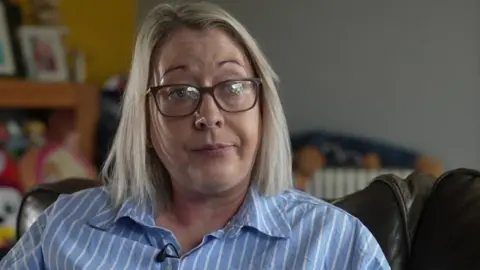Betsi Cadwaladr spends £1m a month on mental health treatment
 BBC
BBCA health board in special measures has spent more than £1m a month sending mental health patients out of area for treatment this year.
Betsi Cadwaladr health board said 48 patients were being sent out of north Wales for treatment on 1 March.
In 2023, there were 22 patients being treated outside of the area and in 2022 it was just three, a Freedom of Information (FOI) request found.
The health board has apologised to patients.
It is not unusual for health boards to explore options for patients in the NHS in England if they cannot offer certain services or if waiting times for specific treatments are especially long.
Medical director for mental health Dr Alberto Salmoiraghi acknowledged they were spending "an excessive amount of money in placing people elsewhere".
He said there were "risks associated with that" but claimed the health board was "trying to alleviate" the situation.
He added that there were several factors including an increase in demand on services, staff shortages and patients requesting to be treated away from their homes, combined with difficulties discharging patients.
A whistleblower working for mental health services contacted Newyddion S4C earlier this year with concerns for patient welfare and said they felt dismayed that the Welsh government had stated things were improving.
According to the source, mental health staff were "exasperated" by increasing numbers of patients being sent elsewhere for treatment at a substantial cost.
In their opinion, a combination of "operational and clinical mismanagement" were to blame.
The FOI also stated that on 26 February 2024, £35,589.76 had been spent on sending mental health patients out of the area.
Newyddion S4C subsequently discovered that in the first three months of 2024, more than £3.5m was spent on sending mental health patients out of north Wales for treatment.
The under-fire health board was placed back under special measures by the Welsh government in February 2023, it had previous been in special measures between 2015 and 2020.

Nia Foulkes from Pentrecelyn, near Ruthin, lives with bipolar disorder.
In 2019 after giving birth to her son, Gwilym, she suffered a relapse and was sent to the mother and baby unit in Manchester for specialist care.
"I felt like I needed my family at that time and it made me feel much better when I had my family there," she said.
"But it took them an hour-and-a-half to get to me, it was a very scary experience."
She added that having mental health problems was difficult and the support of family and friends was "very important".
'Completely unacceptable'
Mental health charity Mind Cymru said there were some situations where patients needed to be sent away from their homes to receive specialist care, but emphasised the best care was close to home.
Simon Jones, head of policy and campaigns, said: "For a lot of these people, they will be getting great support which they will be grateful for, but for others it may be too far from home and will cause challenges for their recovery."
In March, the Welsh government said the leadership and management of the mental health service remained fragile, but there had been a number of more positive inspections over the past 12 months, suggesting a stabilising service.
The Welsh government said it wanted people to access mental health services as close to home as possible, but acknowledged that in some cases, people with complex needs needed care that could " "only be provided at specialist centres outside their health board area".
Plaid Cymru health spokesman Mabon ap Gwynfor said he was aware of mental health patients in north Wales being offered beds as far away as Newcastle or Portsmouth and the current situation was "completely unacceptable".
Darren Millar, Welsh Conservatives spokesman for north Wales, said there needed to be investment in inpatient facilities so people would not have to travel such long distances.

- INSEPARABLE SISTERS: The seven-year-old conjoined twins who defied all odds
- JUNE: VOICE OF A SILENT TWIN: The tragic story of June, her sister and their life in Broadmoor

